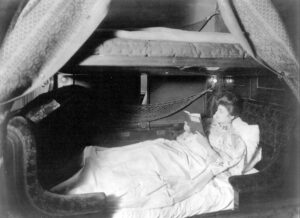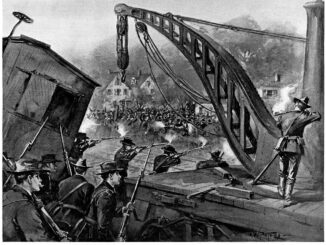George Mortimer Pullman was born in Brocton, New York on March 3, 1841. He is best known for his invention of luxury travel. He passed away on October 19, 1897 – 125 years ago today.
Pullman was one of 10 children born to James and Emily Pullman. They moved to Albion, NY where the father worked on the Erie Canal moving structures out of the path of the canal. After James Pullman’s death in 1853, his son, George, took over the business and continued to win contracts from the state of New York for the Erie Canal project.
Pullman later moved west to chase California gold and then on to Chicago where he resumed his early business of moving buildings so that the city of Chicago could install a sewer system. During the Civil War, Pullman, like most rich men, hired a replacement to fight in his place while he stayed in the North and focused on his idea of luxury train cars.

Train travel had revolutionized the United States; however, it was notoriously uncomfortable and dirty. Trains were great at transporting goods across the land, but passengers had to deal with stuffy cabins and flying embers and ash from the engines. Sleeping cars, new to the industry, were dirty and cramped. Pullman gained national attention with the funeral of President Abraham Lincoln. The funeral procession of the assassinated president traveled by rail from Washington, D.C. to Illinois and covered the front page of every newspaper in the U.S. Orders for Pullman’s new luxury train cars poured in. For five times the cost of a normal sleeper car, travelers could travel in a new luxury.
Pullman’s reputation was tarnished later in life due to his treatment of workers during the Pullman Strikes (see our Labor Day post) and for his marketing of “Pullman Porters.” George Pullman died of a heart attack at the age of 66, three years after the strike. He left $1.2 million to the Pullman Free School of Manual Training, a sign to some of his yearning to help the families of the workers who had served him throughout the years.

